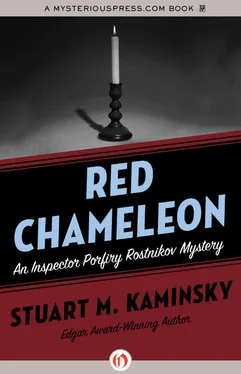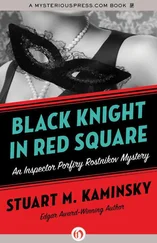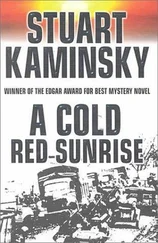Stuart Kaminsky - Red Chameleon
Здесь есть возможность читать онлайн «Stuart Kaminsky - Red Chameleon» весь текст электронной книги совершенно бесплатно (целиком полную версию без сокращений). В некоторых случаях можно слушать аудио, скачать через торрент в формате fb2 и присутствует краткое содержание. Год выпуска: 2012, ISBN: 2012, Издательство: MysteriousPress.com/Open Road, Жанр: Полицейский детектив, на английском языке. Описание произведения, (предисловие) а так же отзывы посетителей доступны на портале библиотеки ЛибКат.
- Название:Red Chameleon
- Автор:
- Издательство:MysteriousPress.com/Open Road
- Жанр:
- Год:2012
- ISBN:978-1-4532-6632-8
- Рейтинг книги:4 / 5. Голосов: 1
-
Избранное:Добавить в избранное
- Отзывы:
-
Ваша оценка:
- 80
- 1
- 2
- 3
- 4
- 5
Red Chameleon: краткое содержание, описание и аннотация
Предлагаем к чтению аннотацию, описание, краткое содержание или предисловие (зависит от того, что написал сам автор книги «Red Chameleon»). Если вы не нашли необходимую информацию о книге — напишите в комментариях, мы постараемся отыскать её.
Red Chameleon — читать онлайн бесплатно полную книгу (весь текст) целиком
Ниже представлен текст книги, разбитый по страницам. Система сохранения места последней прочитанной страницы, позволяет с удобством читать онлайн бесплатно книгу «Red Chameleon», без необходимости каждый раз заново искать на чём Вы остановились. Поставьте закладку, и сможете в любой момент перейти на страницу, на которой закончили чтение.
Интервал:
Закладка:
“If you see me again,” Rostnikov said softly, “you will say good evening or good morning, comrade.”
Rostnikov released the shoulder, and the boy hurried down the stairs, rubbing his shoulder, and hissing back, “Only if you can catch me, lame foot.”
“You catch more with patience than speed,” Rostnikov said softly, knowing even a whisper would carry down the stairway and knowing that the disembodied whisper would be more frightening than a bellow. Rostnikov never shouted. When suspects or superiors shouted, Rostnikov always dropped his voice slightly till they wore down or became quiet so they could hear him. Patience was his primary weapon.
Sarah was home and had a meal on the wooden kitchen table: sour cabbage in vinegar and oil, smoked fish, and brown bread with tea.
Something had gone out of Sarah since Rostnikov’s plan to leave Russia had failed. She had put on a few pounds, and her generally serious round and handsome face smiled even less than it had previously. She had lost her job in a music shop and was having trouble finding another, though she was now working a bit for one of her many cousins who sold pots and pans. Rostnikov’s salary had been badly strained for almost two months.
“Josef?” he asked, hanging up his jacket and moving to the table. “Did he write?”
“No,” she said. “And we can’t tell. We haven’t the money.”
“I’ll call him tomorrow from Petrovka,” Rostnikov said, avoiding her eyes and tearing off a chunk of brown bread. “He’s all right.”
“He’s a soldier,” she said with a shrug, sitting with her hands in her lap, watching her husband eat. “I might have a job next week. Katerina knows someone, a manager at the foreign secondhand bookstore on Kachalov Street.”
Rostnikov paused, his hand on the way to his mouth with a glass of tepid tea. The prospect of his wife’s working for the foreign bookstore lightened his heart for an instant. What was it the English writer Shakespeare said? he thought. “Like lark at break of day arising from the sullen earth.” Shakespeare should have been a Russian.
“That’s wonderful,” he said, “but-”
The “but” was inevitable, part of the protective response of all Russians even when their prospects were better than those of Sarah Rostnikov. Hope was reasonable, but never expect the hope to be fruitful.
After dinner, Rostnikov lifted his weights for an hour, wearing the torn white shirt with “1983 Moscow Senior Championship” printed on it. He knew Sarah considered his wearing the shirt a childish remnant of his moment of triumph a month earlier when he had won the senior park championship. At the same time, he was sure she did not begrudge him his childishness.
The weight-lifting routine was a ritual involving the patient shifting of weights after each exercise, because Rostnikov did not have enough weights to leave them on the bars for each session. Thus, whatever weight and routine he ended a workout with became the first routine of his next workout.
He was just finishing his two-handed curls when the knock came at the door. The windows of the apartment were wide open, and a slight breeze had rippled the curtains occasionally but not altered the heat. Sarah sat across the room, watching something on television, but when Rostnikov looked up at her, he had been sure that she was absorbing nothing she saw on the screen.
His eyes had been on her when the knock came, and she had given a little start of fear.
“There’s nothing to worry about,” he said as the knock came again. He put down the bar and crossed the room. There was a pause and another knock. The knocks were not loud and demanding, nor were they sly and obsequious. They were not the knocks of timid neighbors or aggressive KGB men.
When he opened the door, Zelach’s hand was raised, unsure of whether to knock again. His broad and not bright face looked relieved to see Rostnikov before him, sweating, hair plastered down on his forehead.
“I didn’t mean to-”
“Come in, Zelach,” he said, stepping back.
“This is my wife, Sarah,” he said, nodding toward her.
Zelach smiled painfully.
“Tea?” she said.
“I-”
“You may have tea, Zelach, while you tell me why you are here,” Rostnikov said, returning to his workout.
“I-”
“And you may sit.”
Zelach looked around for someplace to sit, pulled out a kitchen chair, and sat straight and awkward.
“You have something to tell me, or is this simply your first social call?” Rostnikov asked, wiping his wet forehead with his sleeve as he finished his curls. Sarah handed Zelach a cup of tea.
“The photograph,” he said. “I made the calls. There is an old woman in Yekteraslav who remembers Savitskaya. I called the district police. My cousin’s wife’s brother is a sergeant. He went to the village and called me back.”
“Why didn’t you just call us?” Sarah said politely.
“I was working late,” Zelach said. “Inspector Rostnikov said-”
“I appreciate your conscientiousness, Zelach,” Rostnikov said, wiping his forehead with his sleeve and moving forward to pat the man’s shoulder. Zelach smiled and gulped down his tea. “Tomorrow you and I will take a journey to Yekteraslav on the electrichka. We’ll take sandwiches and talk to old ladies. Perhaps we’ll wander in the fields of wheat.”
Zelach looked puzzled.
“They grow soybeans in that area now. My cousin’s-”
“Poetry eludes you, Zelach. Did you know that?” Rostnikov said.
“I know,” Zelach said. “I was always better in numbers in school, though I was none too good in that.”
“Go home now,” Rostnikov said, leading Zelach to the door. “You’ve done well.”
Zelach smiled and looked around for someplace to put his empty teacup now that he was half a dozen feet from the table. Rostnikov took it with a nod and ushered the man out the door, giving Zelach just enough time to say a polite good-bye to Sarah.
When the door was closed, he turned to his wife.
“Is it important?” she said with a touch of curiosity he wanted to catch, nurture, and use.
“An old man was murdered this morning,” he said. “An old Jewish man.”
“And someone cares?” she said with what might have been sarcasm, a mode Rostnikov had seldom seen in his wife.
“I care,” said Rostnikov softly, though in truth it was less that he cared about the gnarled old man than about the man’s children, especially the woman with the bad leg and the edge of madness to her eyes. And, in truth, it was a case. Somewhere there was a man or woman, men or women, who had committed a crime. The crime had been handed to Rostnikov, and his skill was being challenged by the criminal, possibly by the procurator, and certainly by himself.
“I care,” he repeated, and moved toward the bedroom and the shower stall beyond, which he hoped would deliver warm water but from which he expected only a cool dip.
After Vera Shepovik had fired her rifle from the roof of the Ukraine Hotel, she had not wept. She had sobbed in frustration when the gun had jammed after the first shot. Vera’s plan had been to kill as many people as possible in case she was caught. She had seen the porter come through the door, weaving slightly, and had backed into the shadows, away from the edge, behind a stone turret. She had wept again in frustration, because she wanted desperately to shoot the obviously drunken little man. For a moment she even considered leaping from behind the protective bricks, beating the man to death with her rifle, and throwing him down to the street. It would have been a minor inconvenience. Vera was a robust woman, a muscular woman who at the age of forty had been an athlete, skilled at both the javelin and hammer. In 1964, she had just missed the Olympic team. That had been the highlight of her life. The lows had been far more plentiful.
Читать дальшеИнтервал:
Закладка:
Похожие книги на «Red Chameleon»
Представляем Вашему вниманию похожие книги на «Red Chameleon» списком для выбора. Мы отобрали схожую по названию и смыслу литературу в надежде предоставить читателям больше вариантов отыскать новые, интересные, ещё непрочитанные произведения.
Обсуждение, отзывы о книге «Red Chameleon» и просто собственные мнения читателей. Оставьте ваши комментарии, напишите, что Вы думаете о произведении, его смысле или главных героях. Укажите что конкретно понравилось, а что нет, и почему Вы так считаете.












